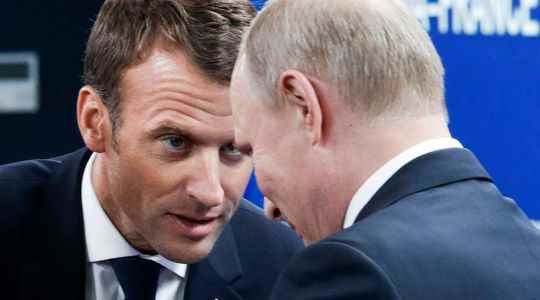This is a telephone conversation this Friday between French Presidents Emmanuel Macron and Russian President Vladimir Poutine. It lasted over an hour and it focused on the Ukrainian crisis. It “made it possible to agree on the need for de-escalation”, declared the Elysée. “President Putin did not express any offensive intention (…). He said very clearly that he was not looking for confrontation”, added the Presidency of the Republic.
On strategic security in Europe, the two Heads of State “agreed on the continuation of the dialogue which will require the Europeans (…) to be fully involved in this dialogue”, which involves in the first place the United States and NATO.
On the conflict in eastern Ukraine, where pro-Russian separatists have been opposing Kiev since 2014, President Putin himself insisted on the existing format of talks (known as Normandy) which brings together Russia, Ukraine, the Germany and France and aims to implement the 2015 Minsk peace accords, according to a statement from the Kremlin. “He also wanted to continue with President Macron the discussion started today,” added the Elysée. The “dialogue is difficult” but the “channels of discussion are open”.
Emmanuel Macron was also due to meet this Friday at the end of the afternoon with his Ukrainian counterpart Volodymyr Zelensky. “He will tell him this evening of our commitment to the sovereignty of Ukraine, our solidarity in this period of tension and our commitment to continue negotiations to find a way to implement the Minsk agreements”, added the French presidency.
Putin says West ‘ignores’ Russian concerns
For his part, Vladimir Putin complained this Friday to his French counterpart of the rejection by the West of his demands for a de-escalation of the crisis around Ukraine, however refraining from announcing a response. The United States and NATO on Wednesday formally rejected demands presented as essential to guarantee Russia’s security: the end of the Atlantic Alliance’s enlargement policy and a return to its deployments on the 1997 borders. 100,000 Russian soldiers remain deployed on the Ukrainian borders, a sign according to Washington that an invasion could be imminent.
“The responses of the United States and NATO did not take into account the fundamental concerns of Russia,” the Kremlin said in a statement devoted to the interview between Vladimir Putin and Emmanuel Macron. “The key question has been ignored, namely how the United States and its allies intend (…) to implement the principle that no one should strengthen their security at the expense of other countries”, argued the master of the Kremlin, according to the same source. According to the statement, Russia will “determine its reaction” after studying the details of the responses of its geopolitical rivals.
If, unsurprisingly, the United States and NATO have rejected the main Russian demands, they have proposed to work on reciprocal limits on the deployment of short and medium range missiles from the two rival nuclear powers in Europe as well as military exercises near the enemy camp. Even if these points were considered “positive” in Moscow, they are considered “secondary”.
For Le Drian, “the ball (was) on the Russian side”
Before the discussion between the two French and Russian presidents, the head of French diplomacy Jean-Yves Le Drian had estimated that “the ball (was) on the Russian side now. “Confrontation or consultation, it’s up to Vladimir Putin to say it,” he judged, while the Europeans and the Americans promised fierce and unprecedented sanctions in the event of an attack on Ukraine. On the table, the strategic Nord Stream 2 gas pipeline between Russia and Germany or even Russian access to transactions in dollars, the queen currency of international trade.
The United States also seized the UN Security Council on Thursday, calling for a meeting on Monday because of the “clear threat” posed in their eyes by Russia to “international peace and security”. President Joe Biden repeated for his part Thursday to his Ukrainian counterpart Volodymyr Zelensky that the United States and its allies would respond “resolutely” to a Russian invasion.
Ukraine considers Russian aggression to be a real danger, but less imminent than the Americans say. On the other hand, she declared herself satisfied with the rejection of Russian demands, Kiev having been aiming for years to join the Atlantic Alliance.
